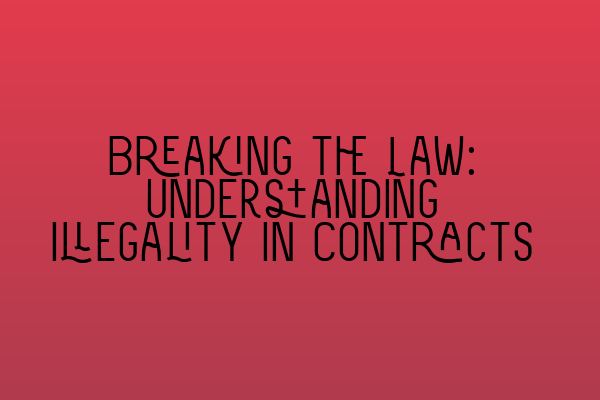Breaking the Law: Understanding Illegality in Contracts
Introduction
Contracts are an integral part of our legal system, serving as the foundation for business transactions and personal agreements. However, not all contracts are created equal, and understanding the concept of illegality in contracts is crucial for both solicitors and individuals entering into contractual agreements. In this article, we will explore the various aspects of illegality in contracts and discuss its implications.
What is Illegality in Contracts?
Illegality in contracts refers to situations where the subject matter or the purpose of a contract goes against the law or public policy. When a contract includes illegal elements, it is considered to be unenforceable by the courts. This principle upholds the ethical and legal standards of our society and ensures that individuals do not receive legal protection for engaging in illegal activities.
Types of Illegality
Illegality in contracts can take different forms, including:
1. Contracts Contrary to Statute:
Some contracts are deemed illegal because they directly violate statutes or laws enacted by the government. For example, a contract to sell illegal substances would fall under this category.
2. Contracts Contrary to Public Policy:
Contracts that are against public policy or deemed to be morally or socially unacceptable are considered illegal. Examples include contracts that promote fraud, bribery, or harm to public safety.
3. Contracts Contrary to Restraint of Trade:
Certain contracts that impose excessive or unreasonable restraints on trade or competition can be deemed illegal. For instance, a contract that restricts an individual’s ability to work for a competitor may be considered unenforceable.
4. Contracts Involving Misrepresentation or Duress:
If a contract is entered into as a result of misrepresentation or duress, it may be rendered unenforceable due to the illegality surrounding the circumstances of its formation. Misrepresentation occurs when one party deliberately provides false information, while duress involves exerting improper pressure to force the other party into the contract.
Implications of Illegality
When a contract is deemed illegal or unenforceable, the consequences can be significant. The courts will typically refuse to uphold or enforce the contract, and the parties will not be able to rely on legal remedies should a dispute arise. This means that parties cannot recover damages, enforce performance, or seek other relief through the judicial system.
Furthermore, engaging in illegal contracts can lead to serious legal repercussions, including fines, criminal charges, and damage to one’s reputation. Therefore, it is essential to thoroughly review and understand the legality of a contract before entering into it, especially as a solicitor or legal professional.
Seeking Legal Advice
As a solicitor, it is crucial to provide your clients with comprehensive legal advice when it comes to forming contracts. Understanding the intricacies of illegality in contracts is vital to ensure that your clients are entering into valid and enforceable agreements. By staying knowledgeable and informed, you can protect your clients’ interests and guide them towards legally sound contracts.
Conclusion
Illegality in contracts is a complex and multifaceted area of contract law. Understanding the different types of illegality and their implications is crucial for both solicitors and individuals entering into contractual agreements. By ensuring the legality of contracts, we uphold the standards of our legal system and protect the interests of all parties involved.
For further legal insights into contract law, consider reading the following related articles:
– Exploring the Impact of Frustration on Contractual Obligations: Legal Insights [LINK]
– Interpreting Contractual Clauses: Unlocking the Hidden Meanings [LINK]
– Legal Aspects of Business Contracts: Key Considerations for Entrepreneurs [LINK]
– SQE Contract Law vs. Traditional Qualifications: A Comparative Analysis [LINK]
– Agreements in Contract Law: Understanding Its Various Types [LINK]
